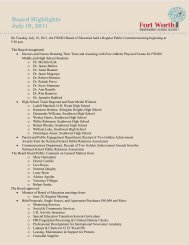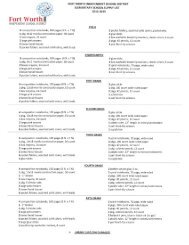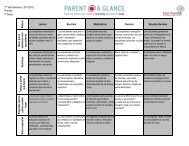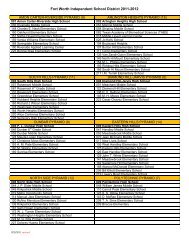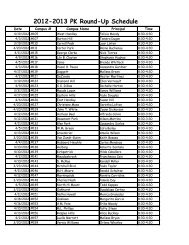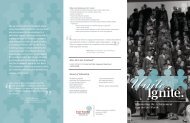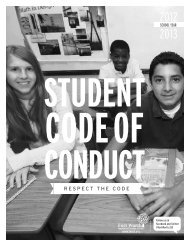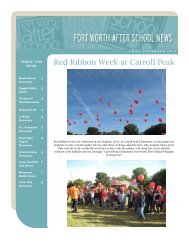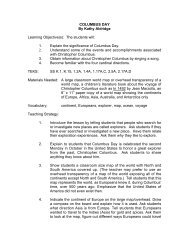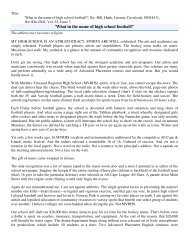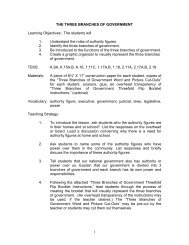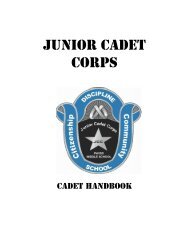Bulletin One 2012 2013 Final.pdf - Fort Worth ISD
Bulletin One 2012 2013 Final.pdf - Fort Worth ISD
Bulletin One 2012 2013 Final.pdf - Fort Worth ISD
Create successful ePaper yourself
Turn your PDF publications into a flip-book with our unique Google optimized e-Paper software.
I. In order to ensure the safety of all students, it is mandatory to follow the directions listed below<br />
when keeping animals on elementary school premises:<br />
A. Animals kept in classrooms must have an annual Certificate of Health signed by a veterinarian<br />
stating that the animal is healthy and does not pose a risk or threat to any student.<br />
B. Animals must be kept in a cage at all times, including weekends.<br />
C. Direct contact with students must be avoided.<br />
D. All excrement must be disposed of and handled by the teachers.<br />
E. Cages should be cleaned two (2) to three (3) times weekly.<br />
F. Animals must be examined by a veterinarian anytime symptoms of illness appear even though<br />
a Certificate of Health is on file.<br />
G. The original Certificate of Health must be filed in the FW<strong>ISD</strong> Health Services Department.<br />
H. Food for animals must be stored in airtight, leak-proof containers.<br />
II. As per the Texas Department of Health ―Voluntary Indoor Air Quality Guidelines for Public<br />
Schools: Paragraph 297.6 Recommended Building Occupant Responsibilities. Subparagraph b.<br />
Product Usage. Products such as pesticides, air fresheners, scented products, and other materials<br />
that may be a health concern, should not be used.<br />
It is FW<strong>ISD</strong>’s intentions that all individuals have a healthy environment for learning and/or<br />
working. The use of the following products such as, but not limited to, plug-in air fresheners and<br />
all other types of air fresheners, pesticides, any cleaning materials brought from home, all scented<br />
products to include burning candles, any and all other materials brought from home that may cause<br />
a health concern are not allowed in FW<strong>ISD</strong> buildings.<br />
As to subparagraph G, Sensitive Individuals, carefully consider and, to the extent feasible,<br />
accommodate the needs of sensitive individuals by the following:<br />
A. Consulting. Teachers of student(s) with allergies or chemical intolerance should consult with,<br />
as necessary, student(s), parents, school health officials, and with written parental consent,<br />
their physicians.<br />
B. Locating. Locate sensitive individuals away from potential sources of symptom triggering<br />
substances and activities.<br />
C. Discouraging. Discourage the use of scented personal care products or other scented products<br />
that may cause adverse reaction in sensitive individuals.<br />
If a student or teacher is a hypersensitive individual and after careful research of the situation no<br />
solution can be found, that individual may be relocated to see if there is an improvement. It is<br />
FW<strong>ISD</strong>’s intention to work with students, teachers or other staff members to maintain a healthy<br />
learning and working environment.<br />
12-13 SY <strong>Bulletin</strong> Number <strong>One</strong> 78 Revised: 10/9/<strong>2012</strong>



